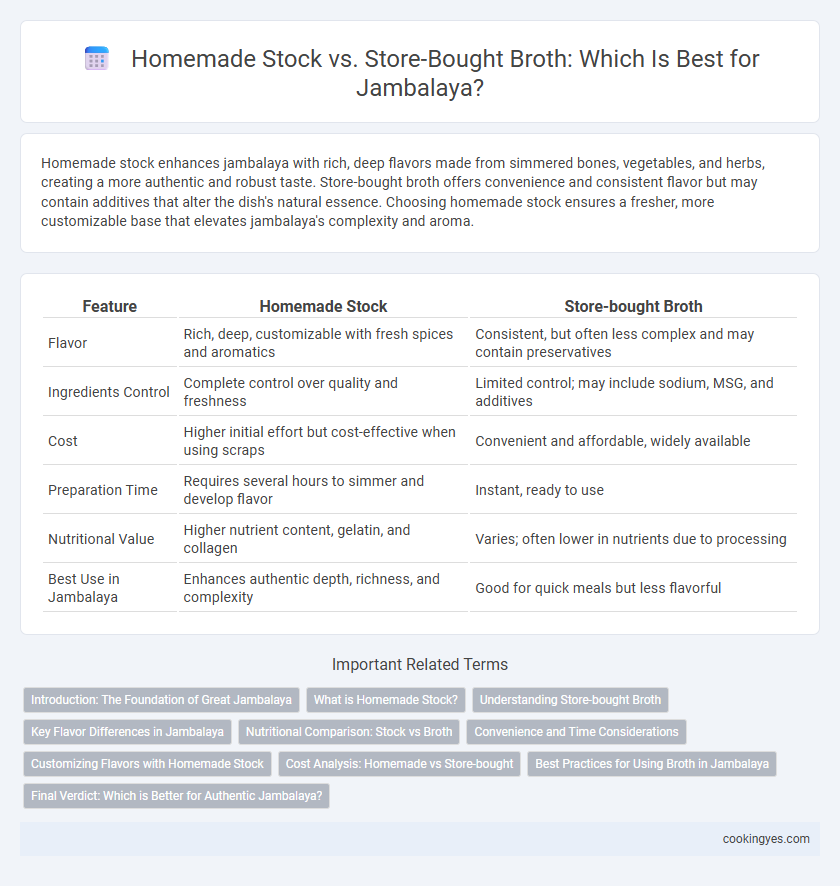Homemade stock enhances jambalaya with rich, deep flavors made from simmered bones, vegetables, and herbs, creating a more authentic and robust taste. Store-bought broth offers convenience and consistent flavor but may contain additives that alter the dish's natural essence. Choosing homemade stock ensures a fresher, more customizable base that elevates jambalaya's complexity and aroma.
Table of Comparison
| Feature | Homemade Stock | Store-bought Broth |
|---|---|---|
| Flavor | Rich, deep, customizable with fresh spices and aromatics | Consistent, but often less complex and may contain preservatives |
| Ingredients Control | Complete control over quality and freshness | Limited control; may include sodium, MSG, and additives |
| Cost | Higher initial effort but cost-effective when using scraps | Convenient and affordable, widely available |
| Preparation Time | Requires several hours to simmer and develop flavor | Instant, ready to use |
| Nutritional Value | Higher nutrient content, gelatin, and collagen | Varies; often lower in nutrients due to processing |
| Best Use in Jambalaya | Enhances authentic depth, richness, and complexity | Good for quick meals but less flavorful |
Introduction: The Foundation of Great Jambalaya
Homemade stock provides a rich, layered flavor that enhances jambalaya's depth, utilizing simmered bones, vegetables, and spices to create a savory foundation. Store-bought broth offers convenience but often lacks the complexity and mouthfeel essential for authentic Cajun and Creole jambalaya recipes. Choosing homemade stock can elevate the dish's overall taste profile, ensuring vibrant, well-rounded flavors in each hearty serving.
What is Homemade Stock?
Homemade stock for jambalaya is a flavorful liquid base made by simmering bones, vegetables, and aromatic herbs, enhancing the dish's depth and richness. Unlike store-bought broth, homemade stock contains natural gelatin and concentrated flavors that add complexity to the traditional Cajun and Creole spices in jambalaya. Using homemade stock significantly elevates the overall taste profile and authenticity of the classic Louisiana dish.
Understanding Store-bought Broth
Store-bought broth offers convenience and consistent flavor, making it a popular choice for jambalaya preparation. Many commercial broths are enhanced with sodium and preservatives, which can affect the dish's overall taste and health profile. Selecting low-sodium or organic varieties ensures better control over seasoning while maintaining the signature rich, savory base essential for authentic jambalaya.
Key Flavor Differences in Jambalaya
Homemade stock offers a richer, more complex flavor profile for jambalaya, infused with deep savory notes from simmered bones, vegetables, and herbs that elevate the dish's authenticity. Store-bought broth often contains added salt, preservatives, and lacks the nuanced depth, which can result in a thinner, less vibrant taste. Choosing homemade stock enhances the balance of spices and ingredients, intensifying the overall sensory experience of classic jambalaya.
Nutritional Comparison: Stock vs Broth
Homemade stock for jambalaya typically contains higher levels of collagen, minerals, and gelatin due to slow simmering of bones and vegetables, enhancing nutritional density. Store-bought broth often has added sodium, preservatives, and fewer micronutrients, which can impact both flavor and health benefits. Choosing homemade stock improves nutrient absorption and adds a richer mouthfeel, crucial for an authentic jambalaya experience.
Convenience and Time Considerations
Using homemade stock in jambalaya enhances rich, layered flavors with natural seasonings, but requires several hours of simmering and preparation. Store-bought broth offers significant convenience and time savings, making it ideal for quick meals or busy schedules without compromising essential taste. Selecting between the two depends on balancing flavor depth against time constraints in jambalaya preparation.
Customizing Flavors with Homemade Stock
Homemade stock enhances jambalaya by allowing precise control over ingredients, resulting in richer, deeper flavors tailored to complement the dish's smoky sausage and succulent seafood. Unlike store-bought broth, homemade stock can be infused with fresh herbs, spices, and aromatics, creating a complex base that elevates the overall taste profile. Customizing homemade stock ensures a unique jambalaya experience that perfectly balances heat, seasoning, and umami.
Cost Analysis: Homemade vs Store-bought
Homemade stock for jambalaya typically incurs higher upfront costs due to ingredients like chicken bones, vegetables, and herbs but yields larger quantities and richer flavors, reducing the per-serving expense over time. Store-bought broth offers convenience and lower immediate cost per unit but often contains additives and may require purchasing multiple cartons to match the volume needed for authentic jambalaya flavors. Evaluating cost-effectiveness depends on recipe volume and flavor preference, with homemade stock providing long-term savings and superior taste for frequent cooks.
Best Practices for Using Broth in Jambalaya
Using homemade stock in jambalaya enhances depth of flavor with rich, natural seasonings that complement the dish's traditional spices, while store-bought broth offers convenience but may contain excess sodium and preservatives. For best results, choose low-sodium store-bought broth to control seasoning and add homemade aromatics like bay leaves, garlic, and onions to mimic the complexity of homemade stock. Adjust seasoning gradually during cooking to achieve a balanced, flavorful jambalaya without overpowering the core ingredients.
Final Verdict: Which is Better for Authentic Jambalaya?
Homemade stock offers richer, deeper flavors essential for authentic jambalaya, providing a robust base that enhances the dish's complex spices and textures. Store-bought broth can be convenient but often lacks the nuanced taste and fresh ingredients vital to traditional Creole and Cajun cooking. For a truly genuine jambalaya experience, homemade stock is the preferred choice to achieve the dish's signature bold and layered flavor profile.
Homemade Stock vs Store-bought Broth for Jambalaya Infographic

 cookingyes.com
cookingyes.com